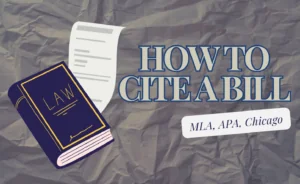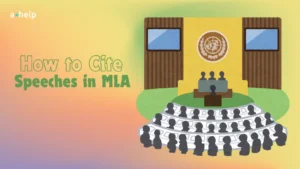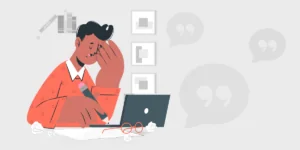Previously, scientific papers were only published in specialist periodicals. Now, users have a far broader range of options for finding the work they need. As a result, learning new citation forms becomes necessary. In general, to reference a scientific paper, regardless of how it was published, you will need its title, author, publication source, number of pages, and other information based on the kind of journal.

✅ AI Essay Writer ✅ AI Detector ✅ Plagchecker ✅ Paraphraser
✅ Summarizer ✅ Citation Generator
General Rules for Citing Journal Articles in MLA
When you cite journal articles in MLA (Modern Language Association) format, remember to follow specific guidelines that ensure consistency and clarity in academic writing. Here are some general rules to follow when constructing your citations for journal articles:
| Author Names | – List the author names as they appear in the journal article. – Invert the first author’s name, but write all subsequent names in normal order – For two authors, use “and” between the names. For three or more authors, list the first author followed by “et al.” |
| Article Title | – Place the article title in quotation marks. – Capitalize the first letter of the major words in the title (use title case). |
| Journal Title | Italicize the journal title and capitalize all the major words. |
| Volume and Issue Numbers | Include the volume number and, if available, the issue number. Format as “vol. X, no. Y.” |
| Publication Date | Provide the year of publication enclosed in parentheses. |
| Page Numbers | Include the range of pages on which the article appears, using “pp.” before multiple pages (e.g., pp. 50-60). |
| Medium of Publication | For articles retrieved online, ensure to include either the DOI (preferred) or the URL. If the article is accessed via a physical journal, the medium is “Print.” |
| Date of Access | When citing an online source, MLA style recommends including the date on which you accessed the material. This is crucial because online contents can change over time. |
There is an easy way to format your citations properly! With our Citation Generator, this daunting process has become much more manageable.
How to Cite an Online Journal Article in MLA
When citing an online journal article in MLA format, you’ll need several key pieces of information: the author(s), the title of the article, the title of the journal, the volume and issue numbers, the year of publication, the page numbers (if available), the DOI (Digital Object Identifier) or a stable URL, and the date of access (since online materials can change over time).
Example of a Works Cited Entry
| Author(s). “Title of Article.” Title of Journal, vol. number, no. issue number, Year, pages. Database or website name, URL or DOI. Accessed Day Month Year. |

Example of an In-Text Citation:
| (Turati 234) |
How to Cite a Published Journal Article in MLA
Citing a published journal article involves a format similar to online articles but without the URL or DOI and access date. Focus on the print specifics like issue, volume, and page numbers.
Example of the format and a Bibliography Entry:
| Author(s). “Title of Article.” Title of Journal. Vol. number, no. issue number, Year. |

Example of an In-Text Citation:
| (Dillahunt 431) |
How to Cite Articles with Multiple Authors in MLA
For articles written by two authors, include both names in the order they appear on the article, linked by ‘and’. For articles with three or more authors, list the first author followed by “et al.” The example of the paper that we use in the first example of this guide was actually written by more than two authors. Let’s take a look how to format a citation of such a journal article:
Example of the format and a Bibliography Entry:
| First Author, and Second Author (or “et al.”). “Title of Article.” Title of Journal, vol. number, no. issue number, Year, pages. Accessed Day Month Year. |

Example of an In-Text Citation (Three or More Authors):
| (Turati et al. 431) |
FAQ
Follow us on Reddit for more insights and updates.





Comments (0)
Welcome to A*Help comments!
We’re all about debate and discussion at A*Help.
We value the diverse opinions of users, so you may find points of view that you don’t agree with. And that’s cool. However, there are certain things we’re not OK with: attempts to manipulate our data in any way, for example, or the posting of discriminative, offensive, hateful, or disparaging material.